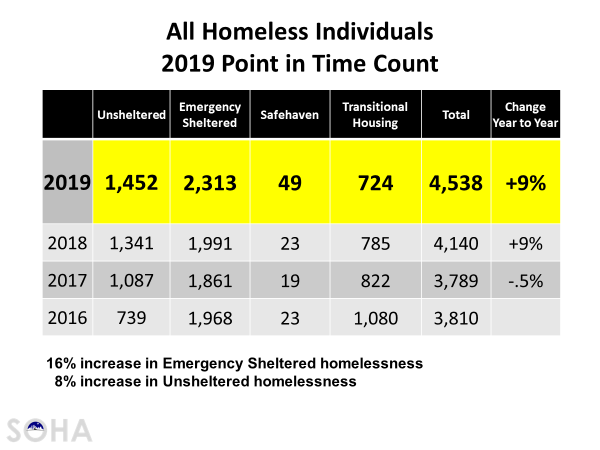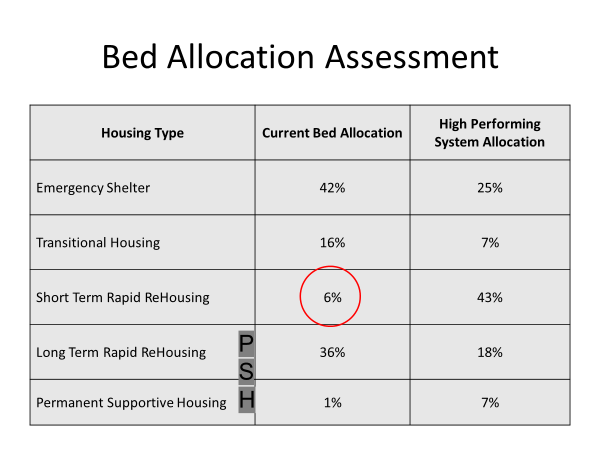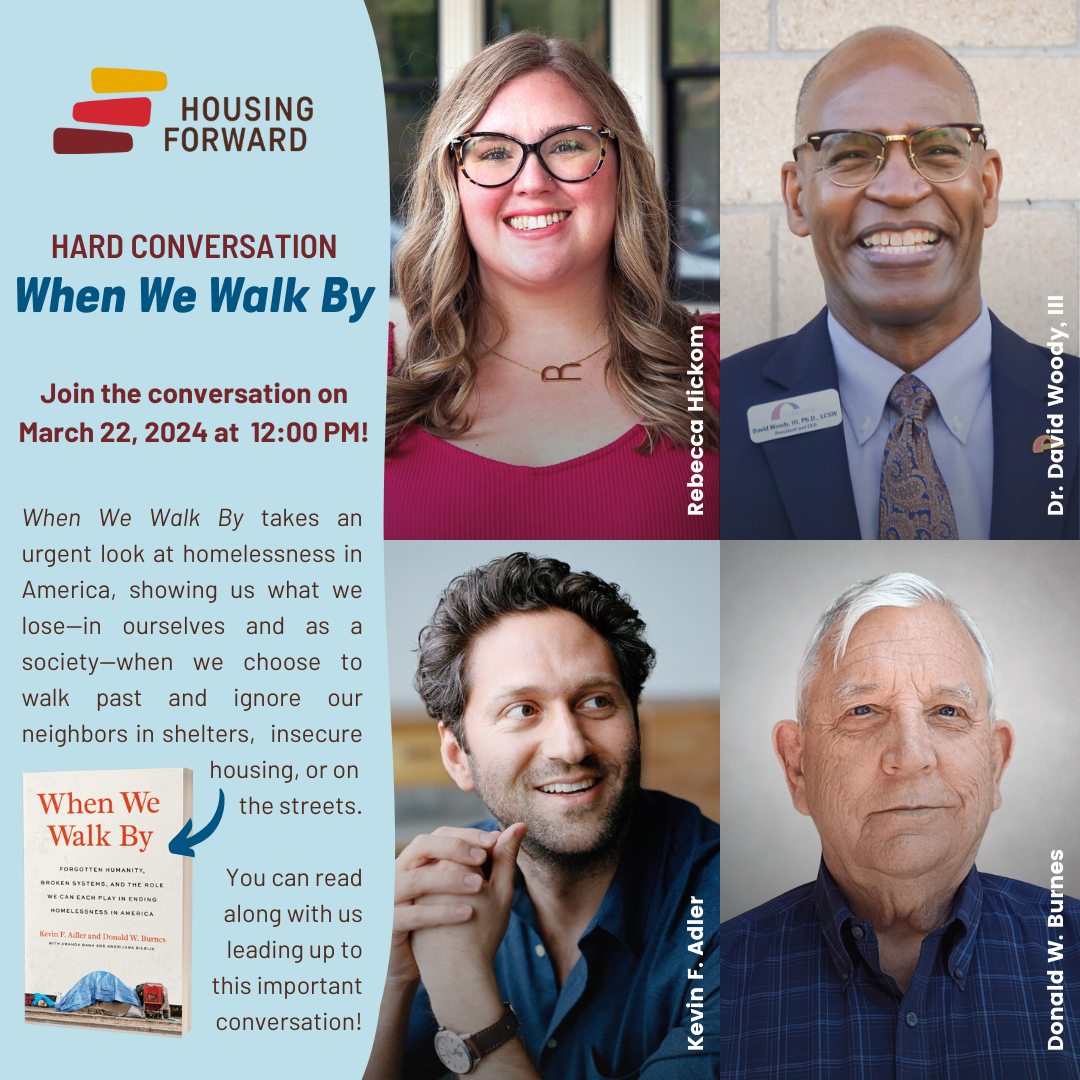Dallas, Texas – Earlier today, Thursday, March 14, 2019, the Metro Dallas Homeless Alliance (MDHA) held its fifth annual State of the Homeless Address, at Goodwill Industries of Dallas. The Address, which drew a crowd of about 320, was delivered by MDHA’s new President and CEO, Carl Falconer. It covered the results of January’s annual homeless count, a thorough system analysis of Dallas’ homeless response system, MDHA’s work, and the steps the community must take to make homelessness, in Dallas and Collin Counties, rare, brief and nonrecurring. The address will be posted to MDHA’s YouTube channel in the next few days. Falconer’s PowerPoint presentation may be downloaded here.
Results of the January 24, 2019 Homeless Count:  The increase in homelessness was not confined to the top line numbers. The number of homeless veterans increased by 100, from 331 to 431 (11.3% of all homeless individuals). Chronically homeless individuals (generally defined as homeless for a year, with a documented disability) increased by 11%, from 424 to 470.
The increase in homelessness was not confined to the top line numbers. The number of homeless veterans increased by 100, from 331 to 431 (11.3% of all homeless individuals). Chronically homeless individuals (generally defined as homeless for a year, with a documented disability) increased by 11%, from 424 to 470.
Homeless Response System Analysis:
MDHA’s Housing Priority List is working. In an effective homeless response system, no placements are made in any program without objectively assessing each person, prioritizing them for service, based on the level of their vulnerability and specific needs, and placing each person on a unified Housing Priority List. Placements in housing are made only from that list, based on priority status and specific needs. 1025 persons were assessed by MDHA and placed on the list, in the last 12 months. 559 of these persons were housed, of which 357 went to permanent housing destinations within the Dallas-Collin Continuum of Care.
At the same time, Dallas lacks a sufficient supply of housing, and specifically, housing that fits the needs of its diverse homeless population. Non-disabled individuals and families don’t have enough housing to meet their needs. Formerly homeless persons, who could move on and make room for others, are stuck in supportive housing due to the demand for safe, affordable and accessible housing dramatically outpacing supply. Not surprisingly, in a sample survey of persons in our emergency shelters, 81% mentioned housing as their number one need.
Rapid Rehousing is significantly underutilized as a tool to end homelessness in our community. Dallas’ homeless response system allocates only 6% of its beds to this proven evidence-based practice. Our community stands in marked contrast in this area, to high performing communities: The Homeless Management Information System (HMIS), the Federally required community-wide database, that drives improvement of homeless services programs, serving 16,972 persons, has seen significant challenges over the last three years. Data quality and reporting capabilities have suffered. This has impaired the system’s ability to set and track clear system performance measures. Earlier this week, MDHA released two requests for proposals (RFPs), one for an HMIS and one for a data warehouse. The latter will allow the HMIS to share data with other community-based data systems. This will allow the community to zero in on challenges and implement efficiencies across the community. This will allow systems across the community, such as criminal justice and medical services, to better serve clients, realize efficiencies, and save taxpayer money. The goal is to have both systems up and running by January 1, 2020.
The Homeless Management Information System (HMIS), the Federally required community-wide database, that drives improvement of homeless services programs, serving 16,972 persons, has seen significant challenges over the last three years. Data quality and reporting capabilities have suffered. This has impaired the system’s ability to set and track clear system performance measures. Earlier this week, MDHA released two requests for proposals (RFPs), one for an HMIS and one for a data warehouse. The latter will allow the HMIS to share data with other community-based data systems. This will allow the community to zero in on challenges and implement efficiencies across the community. This will allow systems across the community, such as criminal justice and medical services, to better serve clients, realize efficiencies, and save taxpayer money. The goal is to have both systems up and running by January 1, 2020.
Ending Homelessness:
Falconer called for all stakeholders in Dallas and Collin Counties, without exception, to rally toward one single vision for ending homelessness. We must, he said, build household incomes, as well as safe, affordable, accessible housing. He called on system and community stakeholders to join MDHA in setting standards, increasing efficiencies in the system, and improving data gathering. He stressed that Dallas must follow the data wherever it takes us and change our programs if the data so warrants.
He asked all attendees to act in the following 48 hours, and give of their time, talent or treasure, stating that he, himself, would start by giving $1,000 to a Continuum of Care homeless services provider.
Falconer ended his address with a passionate call to action: “I’m done managing homelessness. I’m done hearing that Houston is the only city that does anything about homelessness in Texas. I’m done hearing that Dallas can’t end homelessness. I’m done stepping over people sleeping on the sidewalks. I’m done talking about what to do to end homelessness. It’s time to do it.”






